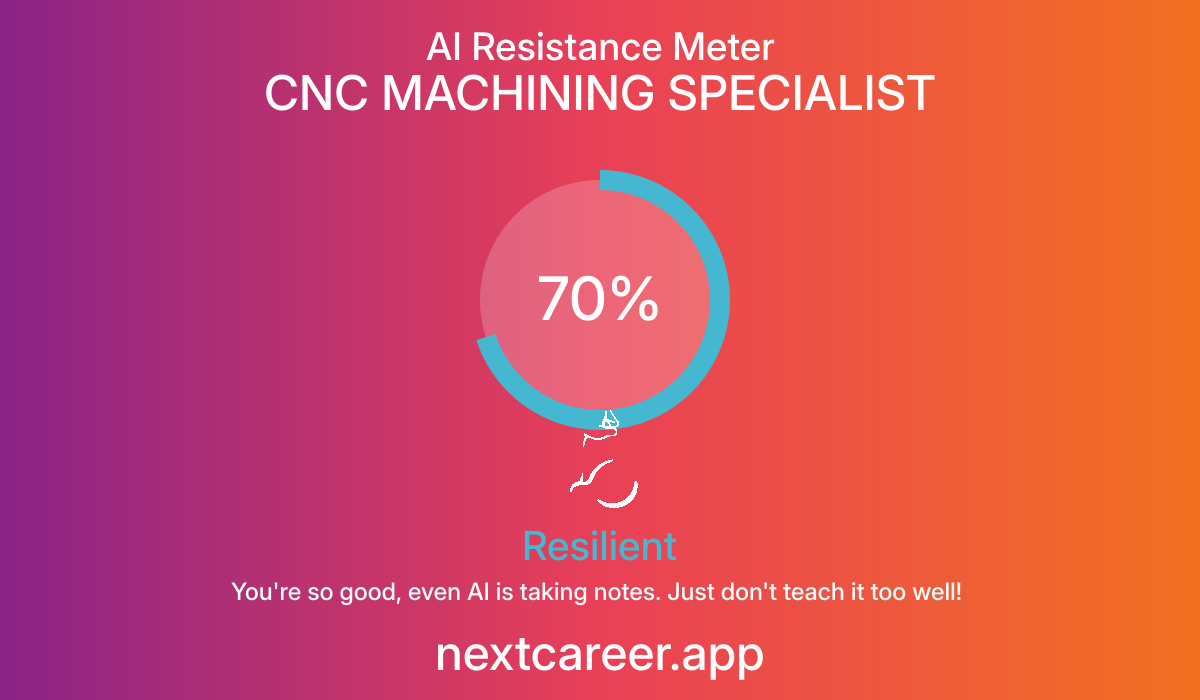AI Resistance Analysis
CNC MACHINING SPECIALIST
CNC MACHINING SPECIALIST
AI Resistance Score
AI Resistance Meter
Resilient
CNC MACHINING SPECIALIST
You're so good, even AI is taking notes. Just don't teach it too well!
CNC Machining Specialists operate computer-controlled machines to manufacture parts with high precision. While AI and automation can significantly enhance the efficiency and accuracy of CNC operations, the role requires critical oversight, troubleshooting, and a depth of mechanical understanding that current AI lacks in certain contexts. In the near term, many routine tasks in CNC machining can be automated, but the complexities of programming, maintenance, and quality assurance will require human oversight. In the long term, CNC Machining Specialists may evolve into roles that focus more on supervising automated tools rather than operating them directly, leading to a shift in skillset but not total replacement.
CNC Machining Specialists operate computer-controlled machines to manufacture parts with high precision. While AI and automation can significantly enhance the efficiency and accuracy of CNC operations, the role requires critical oversight, troubleshooting, and a depth of mechanical understanding that current AI lacks in certain contexts. In the near term, many routine tasks in CNC machining can be automated, but the complexities of programming, maintenance, and quality assurance will require human oversight. In the long term, CNC Machining Specialists may evolve into roles that focus more on supervising automated tools rather than operating them directly, leading to a shift in skillset but not total replacement.
Key Factors
- Cognitive Tasks: While AI can optimize machining processes, the need for human judgment in complex problem-solving remains essential.
- Emotional Intelligence: Collaboration and communication with teams and clients are key aspects of the role; AI lacks emotional insight.
- Physical Skills: Routine machining tasks may become more automated, diminishing the need for certain manual skills.
- Creative Thinking: Creativity in process optimization and custom solutions are areas where human input will still be highly valued.
Human Advantages
- Critical oversight of complex machining processes is difficult for AI, especially under unexpected conditions.
- Emotional intelligence in team dynamics and problem resolution can enhance workplace productivity.
AI Vulnerabilities
- Routine task automation could lead to reduced job openings for entry-level positions in CNC operations.
- AI can quickly learn and replicate standard machining processes with greater precision.
Recommended Actions
- Invest in continuous learning to keep up with advancements in CNC technology and AI integration.
- Focus on developing skills in programming and overseeing automated systems.
- Cultivate soft skills such as teamwork and communication to enhance collaboration in increasingly automated environments.
- Explore areas of specialization, such as part design or quality assurance, where human oversight remains crucial.
In the near term (0-5 years), many tasks will be automated, increasing efficiency but also creating a demand for skilled operators who can manage and troubleshoot AI systems. In the long term (20+ years), CNC Machining Specialists may transition to roles that emphasize advanced technical knowledge and supervisory skills over routine operations. There may also be an increase in the need for specialist roles focusing on machine learning integration into CNC systems and predictive maintenance.

Why Calculate AI Resistance?
Understanding how AI-resistant your career is becoming increasingly important in today's rapidly evolving job market. Our analysis combines multiple factors including required human skills, technological adaptability, and future industry projections to give you a comprehensive view of your career's sustainability.